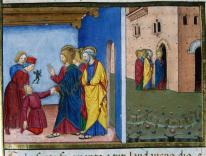Waltzing with the dead of my past the other day reminded me of three men who I have met over the years who at one time or another admitted to me that they had been involved in mass murders. These admissions always came up during conversations and were not anything like confessions. I was always shocked when I heard about them, but the thing that made them keep talking was that I never said that I was shocked nor did I change my facial expression in any way. (Having had a remarkably violent childhood (something I didn't know at the time) taught me to not show emotions when I was confronted with something shocking. Maybe in my life this has what kept the stories coming from other people).
The first story I heard was from my first girlfriend's father. He was a World War II veteran. He was also a long time major drunk; such a champion drunk that he had managed to drink himself out of a very good job at the Post Office, which was a hard place to get fired from in those days. He was good natured, interesting, and very intelligent and he talked like a beatnik despite what seemed to me at the time to be his advanced age. He was the only World War II veteran that I ever met who joined the army well before the war started. Like many working class kids he had gotten in a scrape with the law and the judge had given him what we called in the neighborhood "The Option", which was jail or the army.
Because he was intelligent and was already in the army when the war started, he easily made non-commissioned officer. But because he was a screw-up when he was drinking (and he was always drinking) he got busted. Then promoted again. Then busted again. And again. Towards the end of the war, of the Option Boys that he had started with in his platoon in 1940, only he and a friend of his were still alive and fighting. He told me that one time he and this friend had been given charge of five German prisoners to take back from the front lines to some holding area several miles away. But they didn't feel like walking all the way, so when they got the prisoners into the woods, they simply shot them.
This story rolled out of him with other stories about boozing it up, deserting, and insubordination, and he told the murder story as though it was just another day at the front lines. And I suppose it was. He also told me that it was a common thing on both sides in those days. And maybe it was. I think what bothered me about it then, was his matter of factness about it. On the other hand, I'm not sure what I should have expected. What I didn't know was that I would hear two more stories that would make his seem quaint.
The third story I heard about was at graduate school. I was taking an anthropology class. There were some foreign students in the class, and I had heard that one of them was having tremendous difficulties in grad school. He was an older student from Indonesia. He seemed to do well enough in the class and his English seemed quite good, but he had thus far, after more than a year, been unable to actually finish a single class and get a final grade. I got to know him in class discussions and I found that I liked him quite a bit. So I decided to meet with him after class to see if there was anything I could do to help him.
We met at a McDonalds, and had one of those typical "getting to know you" conversations. At one point I asked him how he had happened to come to that particular university and he told me that he was a government bureaucrat in Indonesia working with some sort of (what he called) tribal agency, which I understood dealt with some of the smaller of Indonesia's many ethnic groups. He was trying to get a big promotion and in order to get it, he needed a doctorate. Then I asked him how he became a bureucrat to begin with.
I'll say here that he giggled a lot when telling me his story. Perhaps he was embarrassed. He told me that he got the job as a reward for heading a death squad during the time that Sukarno was overthrown and replaced by Suharto and 500,000 people were executed. I knew about this of course (and had seen it in the movie The Year of Living Dangerously) and I knew that the killed were supposedly Communists. But he denied that they necessarily were.
He said that his group was about 200 strong. He said that the army would contact him about certain villages. They would go in first and disarm and shoot anyone with a weapon. (He said that the ones with weapons were probably the Communists, in his opinion). Then his group would follow behind. They were not allowed to have guns, so they used bats and knives. He believed that he probably killed about 450 people all told. He said that most of the victims were killed because the people in his group (or who his group represented) were doing a land grab and in some cases, settling old scores. I kept my face blank because this was a story I wanted to hear until the end. He smiled while he told it (and giggled at the very worst descriptions of blood, gore, and slit trenches) and there we were while half the campus seemed to be sitting nearby eating cheeseburgers. I found it so unbelievable, that I set up another meeting with him where I brought one of my fellow grad students and had him tell the story again, which he did, giggles and all.
The second story I heard (in much more detail, because I was closest to him of all of these killers) was a person I introduced in my essay two days ago. He was the manager of the Jewel Food Store I wrote about. His name was Dan.
Dan was a massively middle aged ethnic German with a crew cut whose cunning as a store manager I have already mentioned. But I didn't mention that he was having an affair with my recently divorced mother and despite the fact that he was an utter political reactionary, he threw off this heavy contagious energy that was very good for my brother and me (and my mother) who had been wallowing in a profound blue funk ever since my mother had finally kicked my violent philandering father out.
Dan had an interesting background. He came from an ethnic farm village in Serbia. During the war, he was recruited into the German army along with all the other boys of his village (none of whom survived the war). He decided to join the few and the proud in the Waffen SS. (When he emigrated to America, he had his wife burn the SS blood type indentifer off the inside of his arm with a cigarette so that his membership could not be proved). His division was the 8th SS Florian Geyer Cavalry Division. I found out at the library that his division was engaged in anti-partisan work, shooting and hanging guerillas (by which was meant Jews, Communists, partisans, hostages and more Jews) and burning their villages. His unit killed thousands. He had a thick accent and for some unknown reason prefered to have people think of him as a Russian, maybe because he had killed so many of them.
His mentality was still a peasant one, very clearly defined and simple. Life was about hard work and the weekends were about hiking in the woods, even in the dead of winter. His outlook was so crystal clear that he cut right through the cobwebby depression that infected my family. (He was famous at the store for jumping up on a counter after hours and yelling "I love my job!" while breaking a broomstick in half). His cure for everything was hard work and hiking. When he takes us to a place like Starved Rock in the middle of winter, we go there while it is still dark and stop for a hearty country breakfast along the way. He keeps a flask of slivovitz (Serbian plum brandy); a very powerful paint dissolving drink that he nonetheless let all of us nip at including me to keep us warm.
His solutions to all problems are direct. When my eight year old brother loses one of his mittens down the frozen latrine, Dan picks him up by his heels and gently lowers him (screaming) all the way into the dark hole to get it. At the store, when he catches a boy stealing, he is apt to make him kneel on a pop case in the front of the store with a sign around his neck saying “I am a thief”. He has a one hundred percent success rate at curing juvenile delinquency. But knowing what I know about him, when I saw these boys I couldn't help but think of Jews twisting in the breeze on the end of a rope.
He was absolutely fearless. One day, when the store is robbed by a pair of armed men, he chases them down the street and bags both of them by hitting them with heavy glass gallon milk jugs from a distance of five yards. He has a son that he doesn’t talk about much and a daughter that he absolutely idolizes. His daughter was destined to die young in a car accident and the last I heard of Dan (several years after he retired and passed out of my life) he had taken her death so hard that he himself had died of a broken heart.
Each of these three people were entirely normal to the people around them. Their post murder lives were like everyone else's. I've thought about them all over the years, at the fact that they neither looked evil nor did they act guilty. While each of them did monsterous things, I'm not even sure that these acts constituted any sort of dividing line in their lives. Their acts didn't divide their lives and they didn't divide them from the rest of us. I have met people in my life who I believe were evil (although they may have just been mentally ill), but I wouldn't really put any of these three men into that category, at least as I knew them. I wonder sometimes about how thin the tissue really is between normal behavior and deep evil. Perhaps evil does consist of evil acts rather than evil people; perhaps this is what allows for forgiveness.


